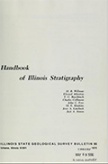Historical:Girardeau Limestone
Lithostratigraphy: Maquoketa Shale Group >>Girardeau Limestone
Chronostratigraphy: Paleozoic Erathem >>Ordovician System >>Cincinnatian Series >>Richmondian Stage
Allostratigraphy: Tippecanoe Sequence
Authors
H. B. Willman and T. C. Buschbach
Name Origin
The Girardeau Limestone was originally named the Cape Girardeau Limestone (Swallow, 1855, p. 109) for outcrops at Cape Point, 1.5 miles northeast of Cape Girardeau, Missouri (SW NE SE 28, 3 1N-14E), but the shorter form "Girardeau" has been used since the late 1800s (Savage, 1909).
Correlation
Judged on the basis of thickness of the underlying Maquoketa strata, the Girardeau could be approximately equivalent to the Fort Atkinson Limestone, but it does not resemble it. It could be as young or younger than the Neda Formation, the interpretation at present favored.
Extent and Thickness
In Illinois the Girardeau Formation occurs only in the extreme southwestern part, and it is exposed only near Thebes, Alexander County. About 30 feet is exposed along Orchard Creek south of Thebes (SW SE NW 21, 15S-3W), which is about its maximum thickness, although the base is not exposed.
Stratigraphic Position
The base appears to be conformable on the Orchard Creek Shale, the upper part of which contains a few limestone beds like the Girardeau. The top is a prominent unconformity that northward from Thebes completely truncates the Girardeau before reaching Gale.
Description
The Girardeau Limestone consists of unevenly bedded, fine-grained to lithographic, dark brown limestone. It has shaly partings and silicified silty interbeds that commonly contain black chert nodules. Although Savage considered the fauna had affinities closer to the Silurian than the Ordovician, the strong unconformity at the top and the transitional, local character of the fauna have caused many to favor its classification as Ordovician, a practice followed in Illinois since 1967 but still considered tentative. The relation of the Girardeau to the Maquoketa elsewhere in Illinois is not known.
Fossils
The Girardeau contains a large fauna, most of it preserved on the bedding planes (Savage, 1917).
References
SAVAGE, T. E., 1909, Ordovician and Silurian formations in Alexander County, Illinois: American Journal of Science, v. 28, p. 509-519.
SAVAGE, T. E., 1917, Thebes sandstone and Orchard Creek shale and their faunas in Illinois: Illinois Academy of Science Transactions, v. 10, p. 261-275.
SWALLOW, G. C., 1855, Geology of Missouri: Missouri Geological Survey 2nd Annual Report, p. 59-170.
ISGS Codes
| Stratigraphic Code | Geo Unit Designation |
|---|---|
